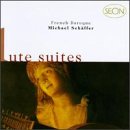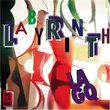| All Artists: Du Fault, Jacques Gallot, Esaias Reusner, Johann Gottfried Conradi, Michael Schäffer Title: French Baroque Lute Suites ( Du Fault / Gallot / Reusner / Conradi) - Michael Schäffer Members Wishing: 2 Total Copies: 0 Label: Sony SEON Release Date: 6/3/1997 Genres: Special Interest, Classical Styles: Chamber Music, Historical Periods, Baroque (c.1600-1750), Instruments, Strings Number of Discs: 1 SwapaCD Credits: 1 UPC: 074646295229 |
Search - Du Fault, Jacques Gallot, Esaias Reusner :: French Baroque Lute Suites ( Du Fault / Gallot / Reusner / Conradi) - Michael Schäffer
 | Du Fault, Jacques Gallot, Esaias Reusner French Baroque Lute Suites ( Du Fault / Gallot / Reusner / Conradi) - Michael Schäffer Genres: Special Interest, Classical
|
Larger Image |
CD DetailsSimilarly Requested CDs
|
CD ReviewsLute playing without fault J. TIMMERMAN | Lawson, NSW Australia | 03/06/2007 (5 out of 5 stars) "This may have been one of the last recordings Michael Schaffer made and it's a beauty. The analogue recording is crisp and realistic while the playing is of the highest order. These lively stylish performances will elevate your opinion of French lute music." In Memoriam Michael Schäffer: Grace, Delicacy and Charm Leslie Richford | Selsingen, Lower Saxony | 03/20/2009 (5 out of 5 stars) "French Baroque Lute Suites:
1. Du Fault (died before 1682): Suite in G minor. 2. Jacques Gallot (died circa 1690): Suite in D minor. 3. Esaias Reusner (junior) (1636 - 1679): Suite in A minor. 4. Johann Gottfried Conradi (died 1699): Suite in A major. Performed by Michael Schäffer (1939 - 1979). Recorded at the Lutheran Church in Haarlem, the Netherlands, in November 1977 under the supervision of Wolf Erichson. First published as an LP in 1979. This 20 bit SBM digital remastering published in 1997 by Sony as SBK 62952. Total playing time: 51'14". If only Michael Schäffer had lived longer! He would by now have been something of the "grand old man" of baroque lute playing. These four suites were the last recording he ever made - and they make sure that he will remain unforgotten! For this music is played totally unhurriedly, with grace, delicacy and charm, reflecting the use of the lute as a courtly, perhaps even effeminate instrument for those with extremely refined taste. The four composers represented here are perhaps not the best-known of baroque lutenists (one would automatically think of Gaultier or Weiss), but their suites give a more than adequate taste of French and German lute music in the second half of the 17th century. The suites by Du Fault and Gallot demonstrate vividly the "style brisé" (broken style), the "jeu inégal", the intimacy and introspection of French lute music of the period. The pieces by Esaias Reusner and Johann Gottfried Conradi are of German provenience, probably written slightly later, and manage to combine some of the more attractive features of the French style with a rather more Teutonic, extroverted vein. I have been enjoying this music on a sunny spring afternoon. Ideally, I suppose, it should be heard on a quiet winter's evening or at night, even, when the volume doesn't need to be turned up and the serenade-like delicacy of the music can meet the listener with all its nuances. Like me today, you may be tempted to thank your Creator for the creative musical genius evidenced in a man like Michael Schäffer. What a pity he didn't live to see the fruit of his pioneering efforts!" |

 Track Listings (23) - Disc #1
Track Listings (23) - Disc #1







